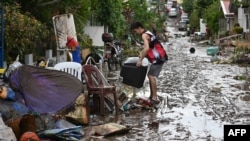The International Federation of Red Cross and Red Crescent Societies is appealing for $3.8 million for emergency assistance to an estimated 80,000 Filipinos whose lives have been devastated by Super Typhoon Goni.
This is the fourth typhoon to hit the Philippines in the past month and possibly the most devastating. Goni, which made landfall Monday, has barreled across the Philippines, leaving a massive trail of destruction in its wake.
IFRS spokesman Matthew Cochrane told VOA the typhoon has destroyed whole villages, damaged or demolished 90% of the homes and buildings.
"We are seeing an increasing severity in storms that we believe is very much linked to climate change and … there are reports that Super Typhoon Goni may have been the strongest storm ever to hit to make landfall anywhere in the world," he said.
Cochrane said it is too soon to know how many people may have been killed, injured or rendered homeless. He said assessments are underway to determine the extent of the damage and the needs.
However, what is clear, he said is people who already are very vulnerable are those who are hardest hit by this catastrophic storm.
"So, we are talking here about farmers, small landholders, people who are really living on the edge of success and survival. Laborers, people who do not own land and exist on the back of their labor, as well as fisherfolk. And again, people who are living on a knife’s edge," he said.
Cochrane said these are people whose livelihoods, health and well-being already had been disrupted by COVID-19. He said the typhoon has left tens of thousands of people bereft and in need of support for a very long time.
For now, he said, saving lives is most important. As a consequence, search and rescue missions will go on for as long as feasible. Immediate priority needs, he said, are to provide survivors of this disaster with food, clean water, shelter, medical care and other essentials.
Once the emergency phase is over, he said, the Red Cross is likely to appeal for more international support to fund long-term recovery and rehabilitation programs.




